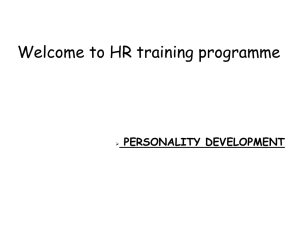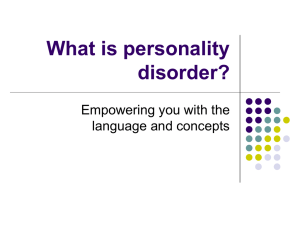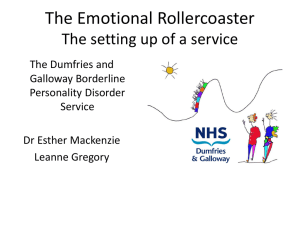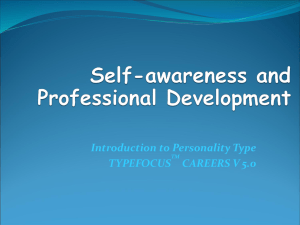Personality Disorders in Long Term Care
advertisement
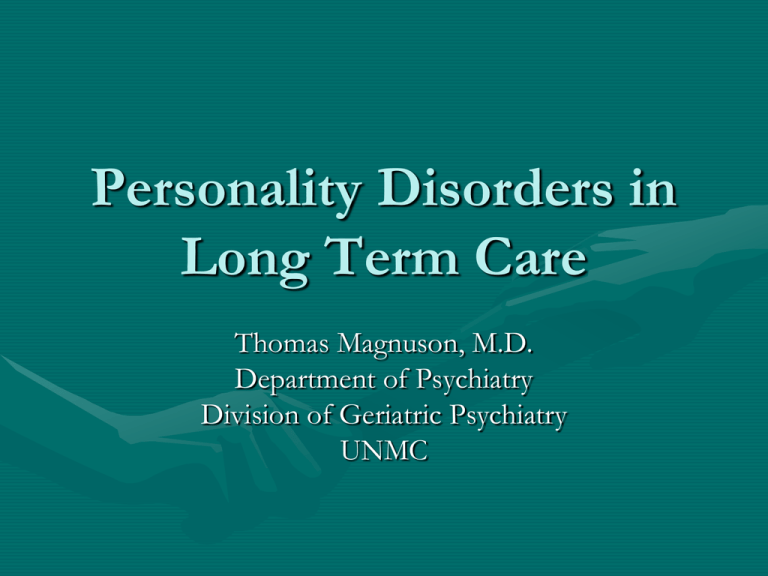
Personality Disorders in Long Term Care Thomas Magnuson, M.D. Department of Psychiatry Division of Geriatric Psychiatry UNMC Websites • www.unmc.edu/nebgec – Information on: • Long-term Care Mental Health Series, 2-hour evening conferences, Annual conferences, Geriatric Minifellowship, Online Educational Modules • http://ltcmentalhealth.forumcircle.com – Long-Term Care Mental Health Forum • www.unmc.edu/cce/gec_modules – 40 online modules for free continuing education credit (for most disciplines) To Obtain Your Nursing Continuing Education Credit • After the program, go to www.unmc.edu/nursing/mk • If paying by credit card, you will be able to print your certificate online • If paying by check, download & print form and send with check via snail mail • All CNE credit questions should be directed to Lisa Anzai at 402-559-6270 or at lanzai@unmc.edu Objectives • Discuss how to recognize a personality disorder • Note the how the manifestations of personality disorders are effected by aging • Delineate current treatment strategies The Difficult Lady • 75 year old white female moves in to the NH – Living at home with daughter, granddaughter • Moved here by another child • APS evaluation about financial abuse • Long, convoluted personal and psychiatric history • Many medications, especially psychiatric and pain – Real disease exists, but… • “Does she really need all this?” – Refuses medications, treatments • Commonly phones assigned provider • Generates dissention among nursing staff The Difficult Lady • Makes accusations about workers – Most unfounded or hard to verify • Family interferes with treatment – To multiple specialists, appointments – Opinions coming out of the woodwork • Feel like you are in the middle • Has hopes of returning home to ramshackle home – With chemically-dependent, unemployed daughter and granddaughter – Denies any abuse going on there • Commonly agitates other residents – Stories of mistreatment – You know the state surveyors are going to interview her What is Personality? • A totality of behavioral and emotional traits – – – – Formed by the end of childhood Stable Predictable Characterize how a person carries out day to day living – What makes you…you What is a Personality Disorder? • A pattern of enduring thoughts and behaviors – Culturally deviant – Often distort or misinterpret information • Display an unusual intensity or range of emotion – Poor interpersonal skills – Trouble controlling impulses What is a Personality Disorder? • We display various aspects of our personality – Pieces of a pie that vary in size – Some more vain, some less vain • Personality disorders are a distortion – Their entirety of personality is composed of one trait or aspect • Narcissistic, dependent, paranoid, e.g. – Often, that trait alone cannot solve problems or deal with stress • Leads to heightened anxiety, depression even psychosis in order to try and cope History • Usually chaotic lives – Broken professional and personal relationships – Interrupted schooling, multiple jobs • Live on the fringes of society – Jail, homeless, still with parents • Reluctant to make changes – Lack flexibility – Problem is with everyone else Types of Personality Disorders • Divided into clusters – Odd and eccentric • Schizoid, schizotypal, paranoid – Dramatic and emotional • Narcissistic, histrionic, antisocial, borderline – Anxious and fearful • Dependent, avoidant, OCPD Odd and Eccentric • Paranoid Personality Disorder – Long history of being suspicious in general • Hostile, angry, easily irritable – Think everyone is trying to take advantage of them • Government, businesses, neighbors – See a conspiracy behind every turn • Interesting views expressed – Readily sue other people Schizoid Personality Disorder • Socially withdrawn – Do not want interpersonal relationships so they do not seek them out – Work history reveal jobs that require little human interaction – Seen by others as eccentric, isolated, lonely – Commonly present as hidden neighbors, quiet coworkers • Pass through life unnoticed Schizotypal Personality Disorder • Strikingly odd, even to lay persons – “Hey, look at that!” • Magical thinkers – Tarot, astrology, UFOs • Embrace fantasy worlds – Star Wars, Dungeons and Dragons • Bizarre in dress, mannerisms, speech – Dress up like movie characters • Poor interpersonal skills – “Oh, grow up!” Dramatic and Emotional • Antisocial Personality Disorder – Usually has history of repeated criminality or antisocial actions • Con men, career criminals, addicts – Never conforms to social norms • Early history of violence or criminality – Lack a conscience • “Do unto others before they do unto you” – World is full of suckers • Manipulative, even charming at first glance Dramatic and Emotional • Histrionic Personality Disorder – Colorful, dramatic, extremely extroverted • Excitable, but shallow emotionally – Everyone must see them • Like a peacock – Cannot develop deep, long-lasting relationships • Everything is skin deep – Respond only to external success measures • Money, physical beauty • Spend time with plastic surgeons Dramatic and Emotional • Narcissistic Personality Disorder – Heightened sense of self importance • For absolutely no reason – Grandiose about abilities, attractiveness • Feel unique in someway • Need to associate with other high status persons – Unempathic • Step over anyone, anytime Dramatic and Emotional • Borderline Personality Disorder – Unstable mood, relationships, emotions • Emotional chameleon – Feel empty inside • Cutters, multiple suicide attempts/gestures – Engender chaos • Reduces their anxiety • Splitting – Watch everyone around them get angry – Multiple marriages, adventure seekers, poor decisions about people, situations Anxious and Fearful • Avoidant Personality Disorder – Similar to social phobia – Lifestyle similar to schizoid personality • Extreme fear of rejection – Desire human relationships • Opposite of Narcissism – Need guarantees of acceptance • Family only people trusted Anxious and Fearful • Dependent Personality Disorder – Get others to assume responsibility • “My husband does all that…” – Subordinate their own needs for those of others • No one asks their opinion • Lack self-confidence – Intensely anxious about being alone • No personal reflection – Exaggerated feelings of being helpless • “Just do it” Anxious and Fearful • Obsessive Compulsive Personality Disorder – Not OCD • Morally rigid, inflexible – No little white lies • Seek orderliness – Stubborn, indecisive • Worry intensely about making a mistake – Nothing ever finished – Ten-year engagements, e.g. Personality and Aging • Can be changed by changes in the brain – Newly introverted, avoidant due to a stroke, e.g. – Disinhibited by frontal lobe symptoms of dementia • Can be changed by changes in life situations – More paranoid due to assault – Increase in social withdrawal by moving into community living Personality Disorders and Aging • Not much known so far – Don’t see older people negatively – Wears away, calms down • Prevalence rates vary – 0.5% to 10% of older people – Can vary depending on where they are studied – Means we have more research to do Diagnosis • Need a good life history – Come to see us because they cannot cope • Commonly to treat anxiety, depression, psychosis • Changes with aging create more to cope with – Continuum theory • Stress can move one along the continuum • Need life history Clues to Diagnosis • Recurrent depressive episodes – Driven by ongoing stress • Poor compliance – Multiple breaks in treatment • More difficulty with age associated stress – Little social support • Chaotic lives – Many changes in jobs, relationships, responsibilities • You feel relieved when they cannot meet with you Problems in LTC • Odd and Eccentric – Become more and more socially isolated • Highly anxious with roommate – Others avoid them • Too eccentric or constant suspiciousness – Reject care by facility providers • Lack of trust – Suspicious of good will • “Trying to lure me in…” – Report perceived abuse to the state • Paranoia about costs, medicines, what staff does to other residents Problems in LTC • Dramatic and Emotional – Take advantage of others, causes chaos • Peers relegated to servants, take money for “favors” • Splitting caused among workers, family, providers • Dramatic emotional displays – Disrupts existing peer relationships • Anger, depression about lack of status – Not treated uniquely • Noncompliance – No meds, refuses to eat or bathe Problems in LTC • Anxious and Fearful – Overuse of medical and facility staff • Want everything done for them – Inability to make decisions leads to delays, frustration • Simple decisions, too – Rigidity with schedules leads to problems with busy staff • Refuses bath at 9:01 – Fear of rejection leads to “nursing home depression” • Planted in their room • Attempts by facility to socialize increase anxiety and depressed mood Treatment • Informal – Difficult residents engender negative thoughts by staff, providers • Use as a barometer – Avoid anger, confrontation • Pulling away reinforces abandonment fears – Will engage in more behavior to stay attached – Regular scheduled meetings with trusted staff • Social services director • Behavioral modification plan – Reward absence of disruptive behaviors Treatment • Informal – Consistency is the key • Everyone needs to be on the same page – Care plans need to be known by all caregivers • Especially CNAs – Emotionally limited in response • Calm, firm approach the best • Know where to draw lines in the sand – Good nurse, bad nurse Treatment • The main treatment is psychotherapy – However psychotherapy does not work unless you want to be there – Personality disorders see nothing wrong • Aging poses problems – – – – – Cognition Physical health Sensory problems Therapists without geriatric experience Therapists do not visit LTC Treatment • Personality disorders commonly develop other psychiatric symptoms – Mood – Anxiety – Psychosis • Treat with appropriate medical treatment – Medications – ECT The Difficult Lady • Diagnosis – Borderline personality disorder • Treatment plan – – – – – – Structure Behavioral treatment plan Appropriate medication management Anxiety log Appointed one formal decision maker Refused psychotherapy Personality Disorders in LTC • Questions?





